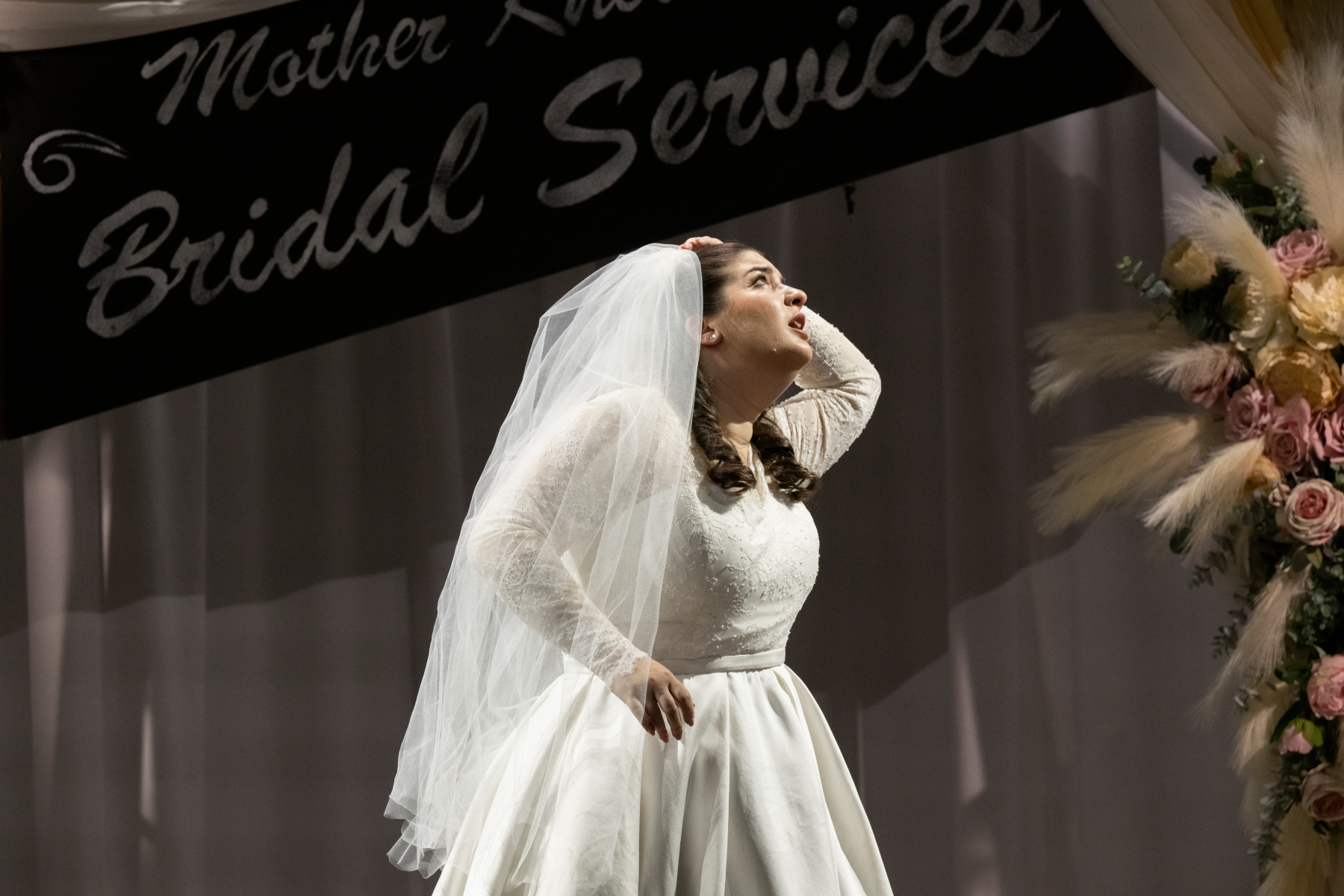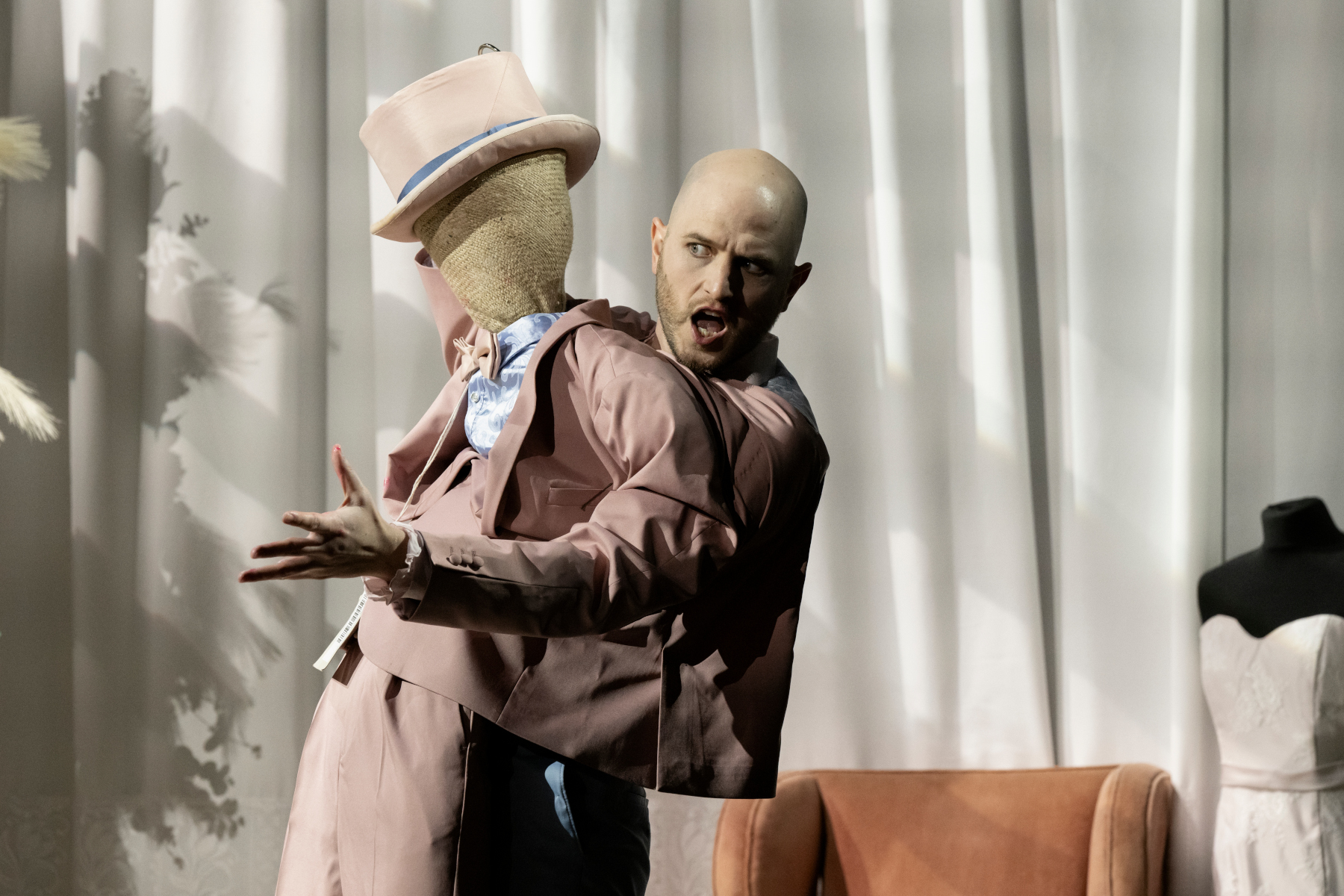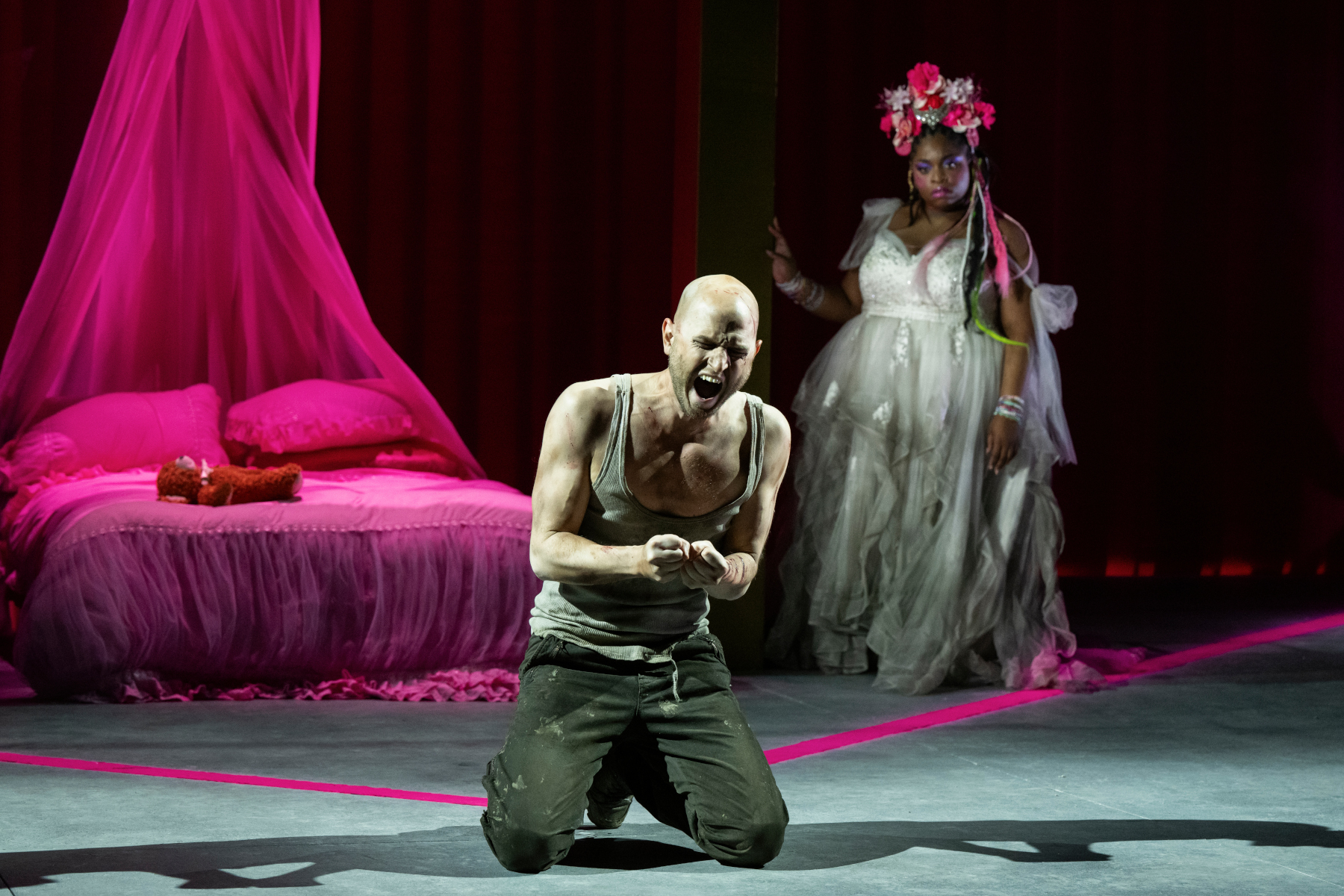An evening of bracing 20th-century rules-out-the-window music-drama is always a good thing now and again, and the current production of a double bill – Bohuslav Martinů’s Larmes de Couteau and John Harbison’s Full Moon in March – at the Linbury not only serves as a palate-cleanser, but gives one a chance to see a couple of rarely performed works. In the case of Martinů’s short opera, this makes a pleasing addition to the decennial celebrations of ‘The Year of Czech Music’, the composer often being the neglected member of ‘The Big Four’.
The librettist of Larmes de Couteau (‘Knife Tears’) was Georges Ribemont-Dessaignes, one of the main contributors to 1920s French Dadaism, and the opera exudes the movement’s counter-cultural tenets from every pore (and, watching it 100 years later, we can also see how the 1950s ‘Theatre of the Absurd’ dramas by the likes of Ionesco and N F Simpson drew on these ideas). It’s a plot of typically fractured ‘nonsense with a socio-political point’ involving a love quadrangle between the bride-to-be Eleanora, her mother, Satan and a hanged man (no prizes for guessing the latter is a non-singing/speaking role); there is disguise, death, resurrection, inappropriate obsession and a core of dark humour.

Although one might imagine setting this to music was a task for Kurt Weill, Martinů’s style, with its more eclectic use of ‘classical’ forms, jazz stylings and sudden bursts of foxtrots or bluesy riffs, fits it much better, bringing to the French text more of the salon than the Tanzpalast.
Eleanor Burke’s production (designed by Anna Reed, with lighting by Bethany Gupwell) captures the comedic grotesquerie of the work well: a Roomba glides away on the carpet; an accordion-playing teddy bear brings allusions to bridal organ music, an enormous floral display hints at cost over taste; Satan and the hanged man wear similar pink and blue costumes, their colours reversed, demonstrating their interchangeable nature; Cocteau-esque arms emerge from a chair; the legs of other hanged men dangle and kick from the proscenium in a whimsical echo of can-can dancers; the mother’s head, at one point emerges between two tiers of the wedding cake.

Musically, it’s a fractured work full of taut little phrases that come and go, but its splintered nature suits the drama, and notwithstanding the awkward vocal lines, there are some charming moments of chugging woodwind, wittily oddball banjo riffs, Martinů’s inevitable gnarly piano writing, and a charmingly slinky aria to the ‘honeyed moon’. Under Edward Reeve’s baton, members of Britten Sinfonia delivered all of this with tight perfection, each musical gesture honed for its dramatic force.
Soprano Valentina Puskás brought a mix of cream and steel to Eleanor’s vocal lines, and gave a brilliant portrayal of a gauche, needy bride for whom (almost) any suitor would do. Playing the mother, Veena Akama-Makia portrayed the character’s shop-bought sophistication and flexible morality with casual élan, and her even creamier soprano voice contrasted well with that of Puskás’s, albeit that it occasionally didn’t have the power to cut through the instrumentation. Baritone Edmund Danon, played Satan with a supple physicality tinged with flashes of loucheness, viciousness and cunning – just right for the role. His voice, too was just right: although it isn’t a voice of great character, its accuracy and flexibility delivered these changes in mood and timbre with deft accuracy.
Harbison’s Full Moon in March sets a libretto by W B Yeats that’s full of the poet’s opulent prolixity. Essentially it’s a kind of cut-price Turandot – an ice-queen who is reluctantly choosing a husband via competition (in this case, singing rather than riddles), and whose inevitable rejects get the chop. The ‘Calaf’ is a swineherd who never actually gets to sing his song, as, rather than tempt his putative inamorata with anonymity, he enters her bedroom and hands over a bag of pig-poo – definitely ensuring that ‘none shall sleep’ – and ends up on the reject pile. Here, though, the queen has no excuse for her chilliness; she is a self-obsessed character who will likely never thaw.

Written in the 1970s, the music is much as expected: angular lines of ‘recitative’ over stuttering, banging, and blarting orchestral textures that feature a deal of work from a prepared piano. It’s similar in nature to Maxwell Davies’s Eight Songs for a Mad King or Miss Donithorne’s Maggot, but without their mischievous twinkle. Once again, though, the band were up to the mark, and delivered this often impenetrable material with surety and verve.
Director Harriet Taylor opted for a minimalist set lit by the hot pink of a 1970s brothel. The queen’s frou-frou bed was surmounted by a huge guillotine blade, to one side yet another massive flower arrangement; her stunted interpersonal skills were represented by a much-cuddled teddy bear, and, towards the end, a cupboard full of these was revealed (presumably symbolising the bodies of her unsuccessful suitors).
Akama-Makia played The Queen, and here once more, her rich voice served her well, but also once again, it was occasionally a little underpowered. Danon took the role of The Swineherd, and, again, his vocal adroitness came into play to deliver a mix of anger and servility. Perhaps the most coherent musical material, with the highest degree satisfying melodic trajectory, is given to the two ‘Attendants’. These, played by Puskás and tenor Jonah Halton, delivered the passages at either end of the opera with beautiful clarity and as much of a degree of lyricism that the score allows, dressed as garish-but-sinister holiday-camp entertainers.
Barry Creasy
Larmes de Couteau
Music composed by Bohuslav Martinů
Libretto by Georges Ribemont-Dessaignes
Full Moon in March
Music composed by John Harbison
Libretto by William Butler Yeats
Cast and production staff:
Eleanora/First Attendant – Valentina Puskás; The Mother/The Queen – Veena Akma-Makia; Satan/The Swineherd – Edmund Danon; Second Attendant – Jonah Halton; Boxer/The Queen – Aisha Weise-Forbes; Directors – Eleanor Burke (Martinů)/Harriet Taylor (Harbison); Designer – Anna Reid; Lighting Designer – Bethany Gupwell; Choreographer/Movement Director – Sarita Piotowski; Costume Production – Sebaryian Freeburn/Silvia Porru; Condcutor Edward Reeve; Britten Sinfonia
Linbury Theatre, Royal Opera House, London, 26 April 2024
Top Image: Scene from Larmes de Couteau
All photos by Camilla Greenwell